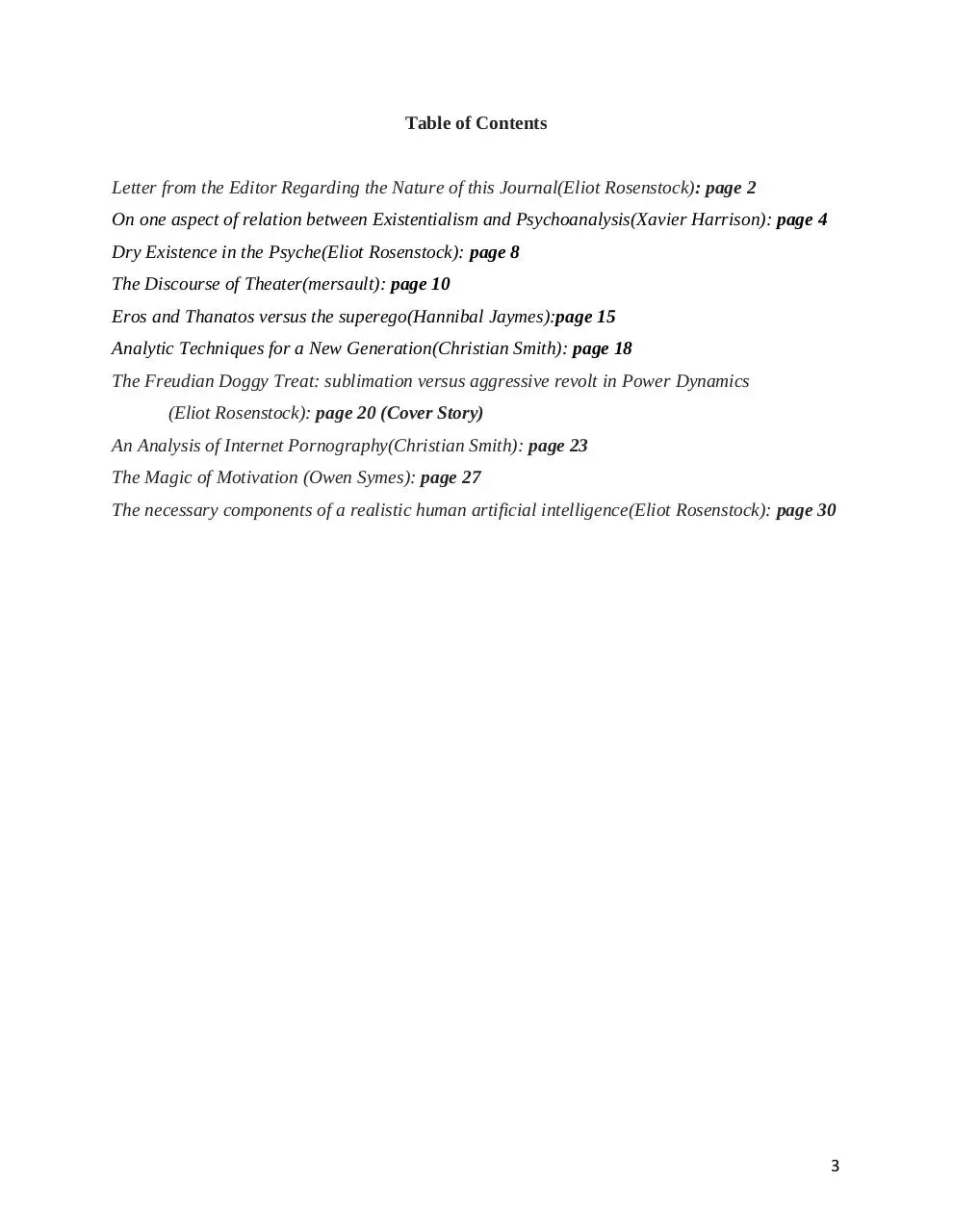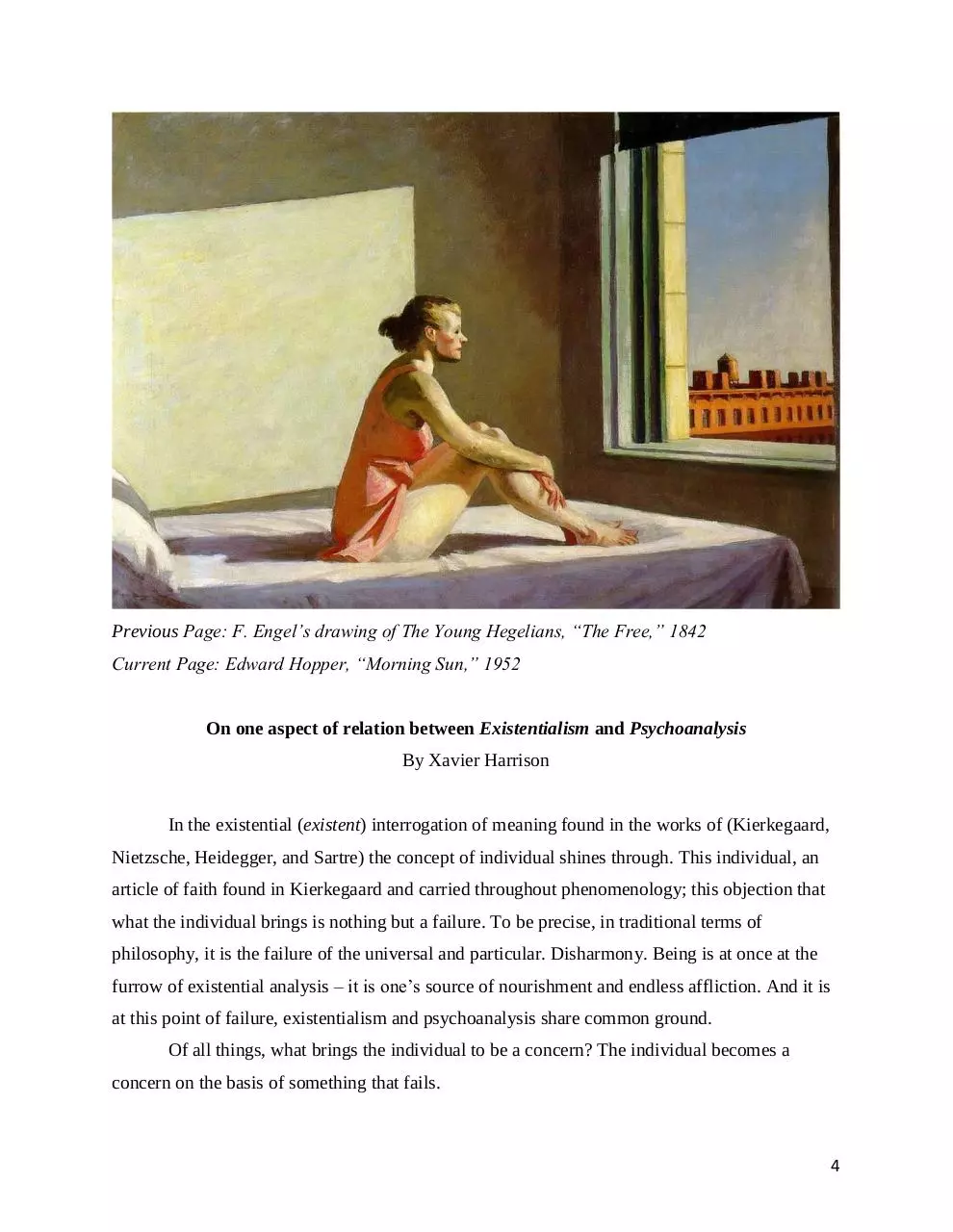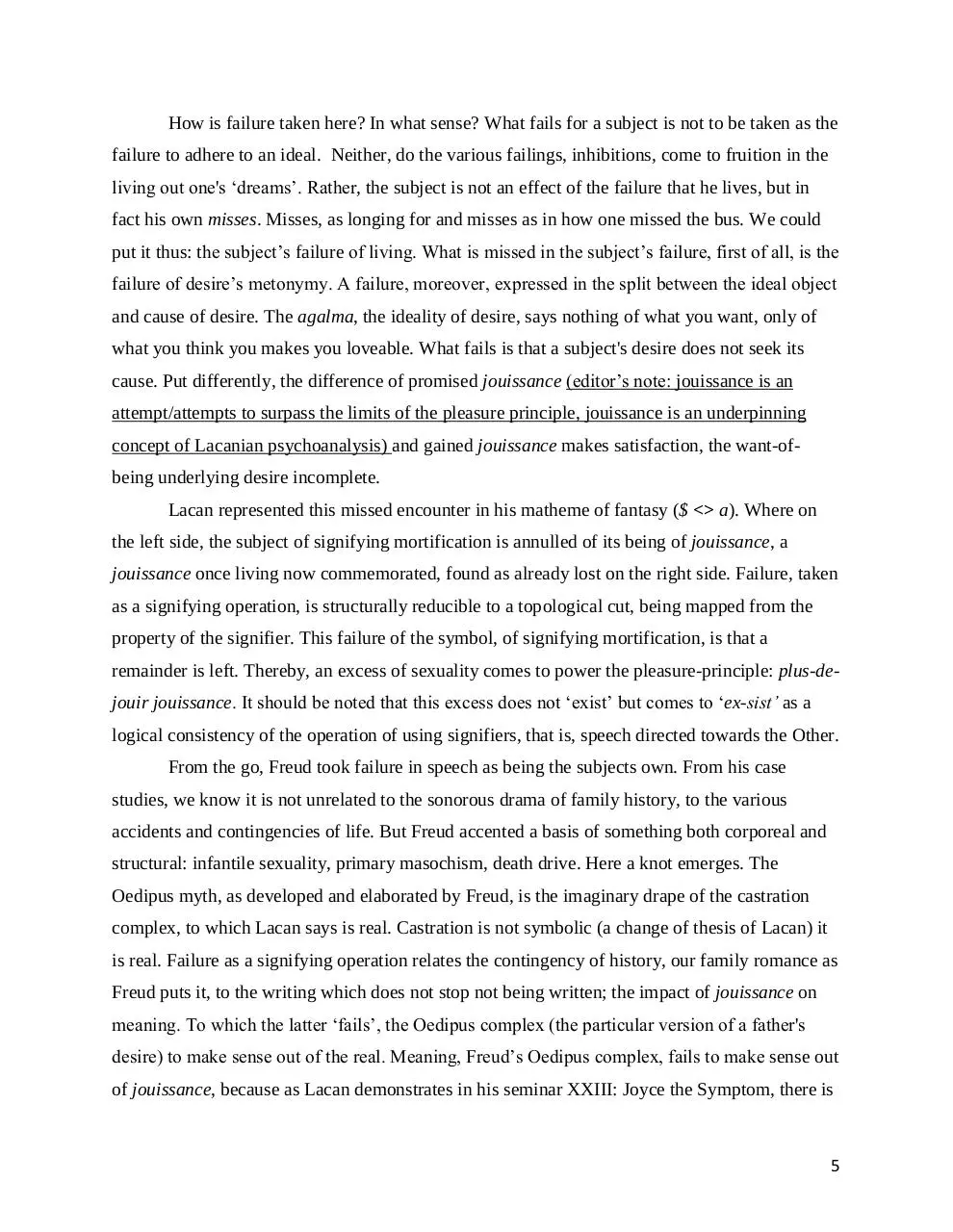Young Freudians Volume 1 1 (PDF)
File information
Author: Eliot Rosenstock
This PDF 1.5 document has been generated by Microsoft® Word 2016, and has been sent on pdf-archive.com on 16/04/2017 at 03:39, from IP address 74.87.x.x.
The current document download page has been viewed 2246 times.
File size: 2.2 MB (32 pages).
Privacy: public file





File preview
1
Letter from the Editor Regarding the Nature of this Journal
This journal was created in the tradition and writings of the Young Hegelians in mind.
Karl Marx, Max Stirner, David Strauss and Ludwig Feuerbach among others used Hegel’s
teachings to create new lines of philosophy based off of Hegel’s ideology involving an objective
system of perception to the best of man’s ability involving power structures, political viewpoints,
and everyday language.
The Young Freudians journal hopes to follow in that tradition. This is not a peer reviewed
psychoanalytic journal, and should be read as philosophy based off of the life works of Sigmund
Freud, Carl Jung, Jacques Lacan, and other psychoanalytic/psychodynamic thinkers.
There was no outlet for these types of new ideas, so I made one. I hope you enjoy it as
much as we do.
-Eliot Rosenstock, Editor
M.A., Clinical Psychology
2
Table of Contents
Letter from the Editor Regarding the Nature of this Journal(Eliot Rosenstock): page 2
On one aspect of relation between Existentialism and Psychoanalysis(Xavier Harrison): page 4
Dry Existence in the Psyche(Eliot Rosenstock): page 8
The Discourse of Theater(mersault): page 10
Eros and Thanatos versus the superego(Hannibal Jaymes):page 15
Analytic Techniques for a New Generation(Christian Smith): page 18
The Freudian Doggy Treat: sublimation versus aggressive revolt in Power Dynamics
(Eliot Rosenstock): page 20 (Cover Story)
An Analysis of Internet Pornography(Christian Smith): page 23
The Magic of Motivation (Owen Symes): page 27
The necessary components of a realistic human artificial intelligence(Eliot Rosenstock): page 30
3
Previous Page: F. Engel’s drawing of The Young Hegelians, “The Free,” 1842
Current Page: Edward Hopper, “Morning Sun,” 1952
On one aspect of relation between Existentialism and Psychoanalysis
By Xavier Harrison
In the existential (existent) interrogation of meaning found in the works of (Kierkegaard,
Nietzsche, Heidegger, and Sartre) the concept of individual shines through. This individual, an
article of faith found in Kierkegaard and carried throughout phenomenology; this objection that
what the individual brings is nothing but a failure. To be precise, in traditional terms of
philosophy, it is the failure of the universal and particular. Disharmony. Being is at once at the
furrow of existential analysis – it is one’s source of nourishment and endless affliction. And it is
at this point of failure, existentialism and psychoanalysis share common ground.
Of all things, what brings the individual to be a concern? The individual becomes a
concern on the basis of something that fails.
4
How is failure taken here? In what sense? What fails for a subject is not to be taken as the
failure to adhere to an ideal. Neither, do the various failings, inhibitions, come to fruition in the
living out one's ‘dreams’. Rather, the subject is not an effect of the failure that he lives, but in
fact his own misses. Misses, as longing for and misses as in how one missed the bus. We could
put it thus: the subject’s failure of living. What is missed in the subject’s failure, first of all, is the
failure of desire’s metonymy. A failure, moreover, expressed in the split between the ideal object
and cause of desire. The agalma, the ideality of desire, says nothing of what you want, only of
what you think you makes you loveable. What fails is that a subject's desire does not seek its
cause. Put differently, the difference of promised jouissance (editor’s note: jouissance is an
attempt/attempts to surpass the limits of the pleasure principle, jouissance is an underpinning
concept of Lacanian psychoanalysis) and gained jouissance makes satisfaction, the want-ofbeing underlying desire incomplete.
Lacan represented this missed encounter in his matheme of fantasy ($ <> a). Where on
the left side, the subject of signifying mortification is annulled of its being of jouissance, a
jouissance once living now commemorated, found as already lost on the right side. Failure, taken
as a signifying operation, is structurally reducible to a topological cut, being mapped from the
property of the signifier. This failure of the symbol, of signifying mortification, is that a
remainder is left. Thereby, an excess of sexuality comes to power the pleasure-principle: plus-dejouir jouissance. It should be noted that this excess does not ‘exist’ but comes to ‘ex-sist’ as a
logical consistency of the operation of using signifiers, that is, speech directed towards the Other.
From the go, Freud took failure in speech as being the subjects own. From his case
studies, we know it is not unrelated to the sonorous drama of family history, to the various
accidents and contingencies of life. But Freud accented a basis of something both corporeal and
structural: infantile sexuality, primary masochism, death drive. Here a knot emerges. The
Oedipus myth, as developed and elaborated by Freud, is the imaginary drape of the castration
complex, to which Lacan says is real. Castration is not symbolic (a change of thesis of Lacan) it
is real. Failure as a signifying operation relates the contingency of history, our family romance as
Freud puts it, to the writing which does not stop not being written; the impact of jouissance on
meaning. To which the latter ‘fails’, the Oedipus complex (the particular version of a father's
desire) to make sense out of the real. Meaning, Freud’s Oedipus complex, fails to make sense out
of jouissance, because as Lacan demonstrates in his seminar XXIII: Joyce the Symptom, there is
5
a jouissance outside meaning, outside the phallic function. An opaque jouissance, proper to the
symptom. A jouissance irreducible to the history of one's life, of the oedipus complex, to the
desire of the Other, to fantasy. Isn’t this the basic finding at the centre of infantile sexuality?
Furthermore, the jouissance of this knot of imaginary, symbolic and real elements, that Lacan
named sinthome, is both semblant and real, a point worth considering.
In short, psychoanalysis takes failure being a subjective experience as a failing immanent
to jouissance, a jouissance which does not work as one would wish it to, because it is real, it
shouldn’t be as Lacan says in Encore but it is… and the real as defined by Lacan, in this
example, symptomatically, is excluded from meaning from the Name-of-the-Father. The failure
of jouissance is a real: that is, a real hole left by the unconscious, and the concomitant response
to this real by a parlêtre, it’s the sinthome, the way of dealing with the hole.
To surmise, then, the co-ordinates of failure in psychoanalysis.
First, desire as failure. Failure is on the one hand, the material condition for revealing the
formations of the unconscious - parapraxis, slip, bungled action, jokes, dreams. Freud gave
deciphering, as the working out of sexual meaning contained in the formations of the
unconscious, an equivalency to the libido. The libido wanders, and the failure is this wandering,
desire ever being 'fulfilled'.
Second, there springs phallic jouissance, the fantasmic lost object believed in by the
neurotic as revealed by the libido’s wandering. The wandering is the masking of a plus-de-jouir.
To which the fantasy, paradoxically reveals and unveils the limit of jouissance. The failure of the
subject sustaining his or her own desire through a scene of castration. Failure is here axiomatic, a
definition of the fantasy by Lacan in Seminar XV.
Thirdly, the unary trait implied by signifiers of jouissance fail to cover the hole in
meaning - that which makes me a substance of jouissance who has no answer in the Other.
Signifiers of jouissance, signifiers made up of jouissance, or better 'letters' are shown as a
repetition of failure. In the sense they are real markers of an event of the irruption of jouissance.
That is to say, there is a jouissance of the body outside sense, One of jouissance, without the
sexed Other.
Taken together, we see failure in psychoanalysis is a response from the real. Meaning
what? That the subject finds its support in these three dimensions of desire; fantasy; and
6
symptom, to which Lacan named the function 'sinthome'. Its status as real is due to the fact it is
without precedence, it is an invention, a nomination, an unfathomable decision.
On the other side, how is failure in existential analysis to be taken? In the ontological gap
opened up by historical vicissitudes of society, religion, philosophy. In a sweeping way, by the
nihilism produced through scientific 'progress', the desire of science.
The unpronounceable decision underlying man’s existence - this is the cornerstone of
existential strands of thought. It is a choice of meaning: to be this or that. A decision of being, at
the level of jouissance as well, to pick out one’s modality of jouissance. To be founded,
inaugurated and to be distinct from what has gone on before: peers, society, family.
Where does failure enter? At the stroke of authentic living, the measuring up to one's
jouissance... is one ideal enough?
The failure is, therefore, located outside the subject. For, the subject if it is not an object
is to be situated on the level of discourse. Meaning, the level of desire, the Other's desire being
an effect that it is irreducibly situated between: alienation and separation. The subject, conceived
as ideal, then becomes a remedy by way of meaning to stitch up what doesn’t work in the Other.
The failure of the Other in being complete, and consistent propels the individual to embody its
own alienation, at the expense of separation.
By being an authentic self, the alienation of being a determination in the field of the
Other, is misconstrued. “You” are already separated from yourself; the “I is an Other”. Is this not
the shortcoming of Kierkegaard's analysis of authentic despair? The fact that desire in being
based on the ‘sins of the father’, cannot make up for this sin for desire is perverse, that is,
excluded from the Other?
Failure, for existential analysis, is found in the signifier not catching the real, condemned
in only supplying semblants in its place; of truth being half-said; the bar on the subject and
Other. Failure in existential analysis is the rejection of the bar of the subject and Other. With the
only solution of being what one is: the construction of a master signifier, that is to say, to adopt
the strategy of making semblants. More alienation! No separation!
So, it is at the very point where psychoanalysis and existential came together that they
part. For one, a discourse, focuses on the failure of satisfaction, the One-saying of a speakingbeing, while the other indexed on meaning as a plug, a solution. In a word for each, both variants
on the treatment of the symptom; the symptom of existing.
7
(Rubber Rabbitbrush Plant, Utah State University database on Invasive Weeds)
Dry Existence in the Psyche
by Eliot Rosenstock
Jung posits that if a delusion in the patient's mind as real, it is for all intents and purposes
real. This is only partially true. Why are so many psychoses involving things that just aren't true,
from the imaginary to outright paranoid, cause for internal distress then?
This is where I hypothesize the universal unconscious/preconscious/conscious knowledge
of "Dry Existence." A godless, purely material realm, that each human being has a different
relationship to. From conscious denial, to repression, to half acceptance, to the lack of gods but a
pushing back against the lack of afterlife, human beings deny Dry Existence in various forms.
This causes psychic distress in different manners, because internally, there is always knowledge
of the Dry Existence within each human being.
8
From Jung’s The Red Book: "I believe we have the choice: I preferred the living wonders
of the God. I daily weigh up my whole life and I continue to regard the fiery brilliance of the
God as a higher and fuller life than the ashes of rationality. The ashes are suicide to me. I could
perhaps put out the fire but I cannot deny myself the experience of the God. Nor can I cut myself
off from this experience. I also do not want to, since I want to live. My life wants itself whole.”
Ashes are an apt description of the leftovers of the spirit-filled psychic world that we do
not which to leave. The signifying chains that we make are in a sense, spirit, although not in any
sort of psychic way that Jung would expound on. Everything viewed by us is in a sense, imbued
with spirit. We have have some knowledge that our perception of various objects is based on it’s
surroundings and the battery of signifiers that we hold in our minds that define the object.
Dry Existence does not refer to a complete de-signifying of existence; rather, it involves
the removal of empirically incorrect hypotheses in our signifying chains that define the people
and objects that surround us.
The priest, the staunch conscious believer in God, feels the jouissance of preaching about
the afterlife and the timidity and beauty of Christ, and is left with an emptiness when facing nonbelievers. The atheist, when facing the believer, may feel conflict, but it is not the same
emptiness as the believer meeting his opposite. The believer is dealing with the repression of his
knowledge of “the dry existence.” He has no direct perception or indisputable evidence of a
supernatural world, where as the godless ones have a laundry list of signifying chains that
support their world view.
The lack of direct signifier indicating the existence of spirits or gods causes the believer
the pain of the cognitive dissonance between his unconscious knowledge of Dry Existence and
the conscious belief in the spiritual and supernatural.
Psychotherapeutically, there is nothing to be done to counter a belief in God, as that
would be a praxis that does not respect the cultural tradition of the client. We can analyze the
place god has in the client’s life and how the client uses God in their psyche, but to tear down
their belief in God is unethical and unhelpful.
What is to be done about the believer? Nothing. One day they will die, and I will die, and
that will be that.
9
Download Young-Freudians-Volume-1 1
Young-Freudians-Volume-1_1.pdf (PDF, 2.2 MB)
Download PDF
Share this file on social networks
Link to this page
Permanent link
Use the permanent link to the download page to share your document on Facebook, Twitter, LinkedIn, or directly with a contact by e-Mail, Messenger, Whatsapp, Line..
Short link
Use the short link to share your document on Twitter or by text message (SMS)
HTML Code
Copy the following HTML code to share your document on a Website or Blog
QR Code to this page

This file has been shared publicly by a user of PDF Archive.
Document ID: 0000583815.